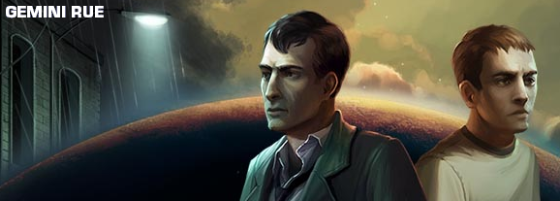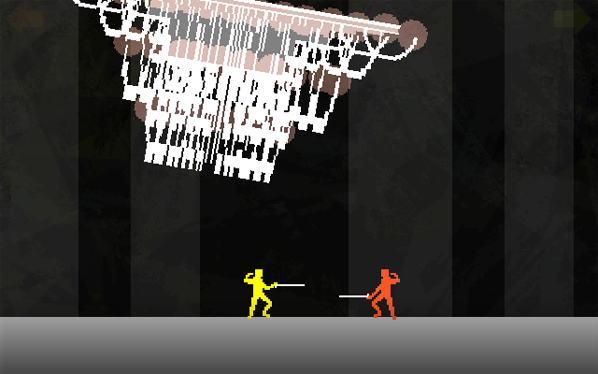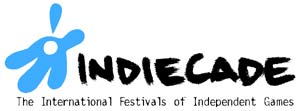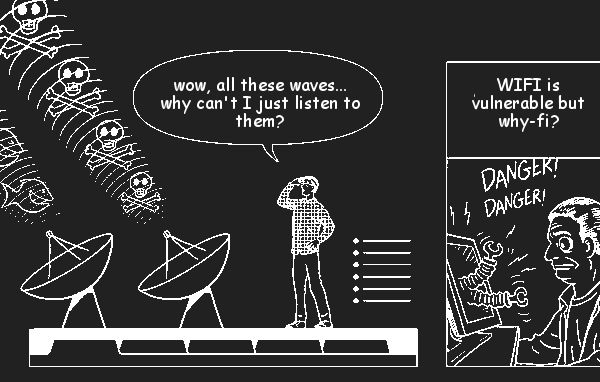
The IGF award nominee Gemini Rue has finally been published by Wadjet Eye Games and is available for purchase.
Azriel Odin, ex-assassin, arrives on the rain-drenched planet of Barracus to find someone. When things go horribly wrong, he can only seek help from the very criminals he used to work for.
Meanwhile, across the galaxy, a man called Delta-Six wakes up in a hospital with no memory. Without knowing where to turn or who to trust, he vows to escape before he loses his identity completely.
As fate brings these two men closer together, we discover a world where life is cheap, identities are bought and sold, and a simple quest for redemption can change the fate of a whole galaxy.
Gemini Rue is a neo-noir, full length point ‘n click adventure game, encompassing a dual narrative. Gemini Rue features traditional adventure game elements, such as puzzle-solving, dialog systems, and more, but also incorporates more unorthodox features, including an action system, and an investigations system.
I had the privilege of beta testing the game and the features added since then are quite impressive including voice acting and new character portraits. We are real excited that this game has finally been released.
Help support our indy developers and try out this fantastic game! Buy the game here.

Game Lab artist-in-residence Mark Essen’s game Nidhogg, nominated for several awards at the 2011 Independent Games Festival, won this year’s Nuovo Award, given for “abstract, short-form, and unconventional game development.”
See more of Mark’s work here.

http://www.indiecade.com/index.php/submissions/index_2011/
//IndieCade 2011 Submissions Now Open
IndieCade was established to create vibrant festivals and showcases dedicated to independent games and open to the public. It is our goal to showcase exciting and innovative new work, host productive networking environments, hold important discussions, and have a lot of fun.
IndieCade invites independent game artists and designers from around the world to submit interactive media of all types. Work-in-progress is encouraged.
A diverse jury of industry leaders will select entries for finalists and top awards at the IndieCade 2011 Festival. All entries for the Festival will also receive consideration for presentation at additional IndieCade showcases.
Gamemakers and their teams are supplied with passes to all the events they are selected and all related IndieCade social events. It is IndieCade’s ultimate goal to bring the eye of the public and industry to your games.
//Submission Processing Deadlines and Fees
Submissions open March 1, 2011 and close May 31, 2011. Late submissions will be accepted until June 15, 2011 with an additional fee.
IndieCade is an independent organization. All submission fees are used specifically and entirely to cover the costs associated with processing your submission.
Early Submissions March 1 – March 31, 2011: The early submission processing fee is $35.
Standard Submissions April 1 – May 31, 2011: The standard submission processing fee $45.
Late Submissions June 1 – 15, 2011: Submissions Close May 31, 2011, however late submissions will be accepted from June 1 – June 15, 2011 for a $70 processing fee.
If you have a discount code you may apply only one code per entry.

Since Walter’s lecture where he talked about the Wi-Fi hacking workshops that he runs in Europe, we had a huge demand for one here. We’re real excited to announce that Walter will be running his notorious Why-Fi workshop before he leaves his residency here. Workshop is TOMORROW, get more info here.
Scrum is an iterative, incremental framework for agile software development. Clinton Keith combines his experience as both video game developer and Agile practitioner to apply Scrum philosophy to the unique challenges of video game development. Blizzard, Lucas Arts, Apple, and EA, are just some of his myriad well known clients.
From Wikipedia:
Scrum is a process skeleton that contains sets of practices and predefined roles. The main roles in Scrum are:
- the “ScrumMaster”, who maintains the processes (typically in lieu of a project manager)
- the “Product Owner”, who represents the stakeholders and the business
- the “Team”, a cross-functional group of about 7 people who do the actual analysis, design, implementation, testing, etc.
During each “sprint”, typically a two to four week period (with the length being decided by the team), the team creates a potentially shippable product increment (for example, working and tested software). The set of features that go into a sprint come from the product “backlog”, which is a prioritized set of high level requirements of work to be done. Which backlog items go into the sprint is determined during the sprint planning meeting. During this meeting, the Product Owner informs the team of the items in the product backlog that he or she wants completed. The team then determines how much of this they can commit to complete during the next sprint, and records this in the sprint backlog.[6] During a sprint, no one is allowed to change the sprint backlog, which means that the requirementsare frozen for that sprint. Development is timeboxed such that the sprint must end on time; if requirements are not completed for any reason they are left out and returned to the product backlog. After a sprint is completed, the team demonstrates how to use the software.
Scrum enables the creation of self-organizing teams by encouraging co-location of all team members, and verbal communication between all team members and disciplines in the project.
Clinton Keith will be giving a workshop on game development with SCRUM this Thursday in the UCLA Game Lab. Spaces are limited, RSVP today.
Check out the event page here: http://games.ucla.edu/games/scrum/




